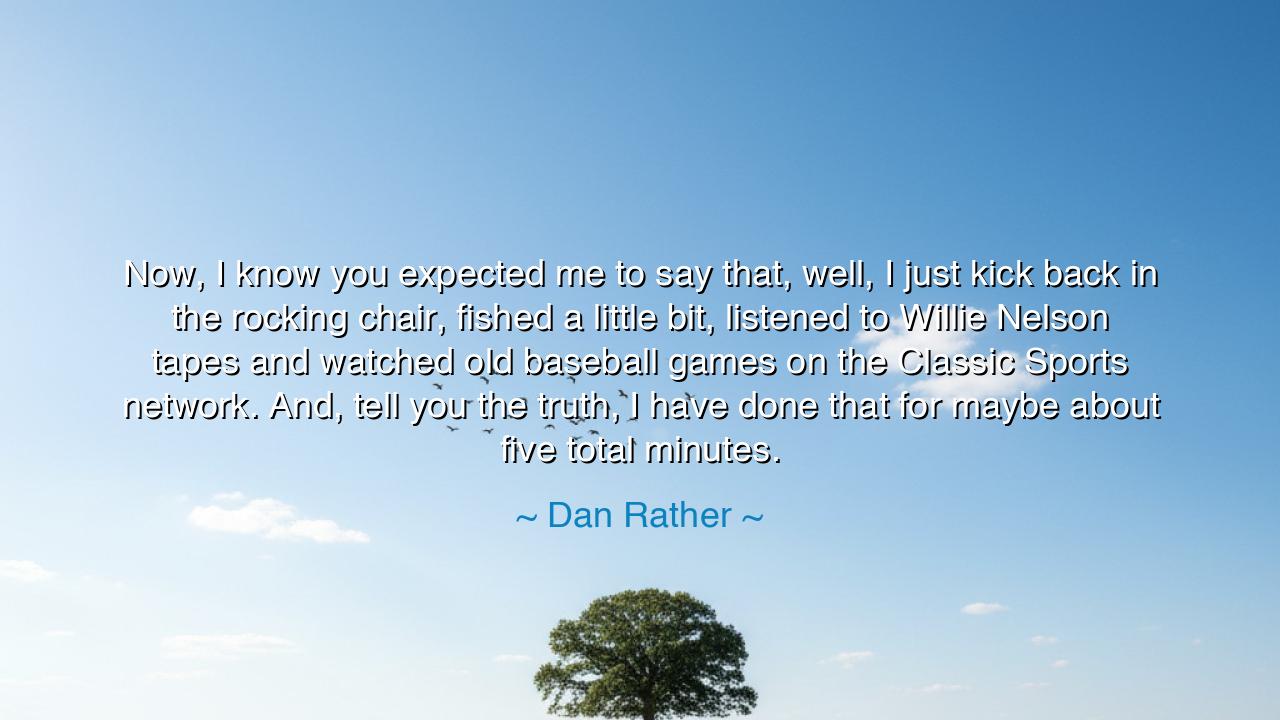
Now, I know you expected me to say that, well, I just kick back
Now, I know you expected me to say that, well, I just kick back in the rocking chair, fished a little bit, listened to Willie Nelson tapes and watched old baseball games on the Classic Sports network. And, tell you the truth, I have done that for maybe about five total minutes.






The words of Dan Rather, “Now, I know you expected me to say that, well, I just kick back in the rocking chair, fished a little bit, listened to Willie Nelson tapes and watched old baseball games on the Classic Sports network. And, tell you the truth, I have done that for maybe about five total minutes,” carry within them a profound lesson about purpose and the restless fire of the human spirit. Spoken with humility and humor, these words remind us that true vocation cannot be set aside like an old garment, nor can the heart that has burned with passion be content to fade into idleness. For the man who has spent his life in pursuit of truth, reflection, and service, the rocking chair is not a throne, but a cage.
The origin of this thought lies in Rather’s long years as a journalist, a seeker of stories, a voice in the living history of a nation. To step away from such a calling is not to abandon it altogether, but to shift into another form. Retirement, for him, could not mean silence. Instead, it was a moment to declare: Though the world expects me to rest, my heart demands that I continue to live with energy and purpose. His jest about fishing, music, and baseball reveals a deeper truth: the man whose spirit is forged in action finds peace not in withdrawal, but in continued striving.
This same spirit has echoed through the lives of the great ones before us. Consider the tale of Cato the Elder, who, even in his advanced years, could not rest from his labors for Rome. Though the Senate expected him to grow quiet, he still rose to speak, still counseled wisdom, still called for vigilance against Carthage. He did not recline into the ease of old age, for his sense of duty burned too fiercely. Just as Rather quipped about finding time for leisure but never truly dwelling in it, so too did Cato live with restless purpose until his final breath.
It is tempting to believe that life offers us a time when we can simply cease our striving, sit back, and let the world pass by. Many dream of retirement as endless ease, days filled with leisure and simple pleasures. Yet Rather reminds us that the soul, once awakened to work of meaning, cannot be lulled by such dreams for long. Leisure is sweet in moments, but it cannot sustain the spirit. The true joy of life is not in ceasing to live with intensity, but in carrying that intensity into new seasons, new endeavors, new ways of serving.
The lesson here is both simple and demanding: do not think that the goal of life is endless rest. Rest has its place, yes, but life is meant for engagement, for action, for creation, for giving. Even when one chapter ends—be it a career, a role, or an era—another opens, calling us not to idle away the hours but to pour ourselves anew into what matters. This does not mean denying yourself moments of quiet, but it does mean that your deepest fulfillment will come not from the rocking chair, but from the path of continued purpose.
Practically, this teaching bids us to shape our lives so that our identity is not tied only to work or title, but to the deeper currents of calling. If you retire from a career, find a cause to serve, a story to tell, a craft to master. If one role ends, do not surrender to stagnation, but transform your energy into another expression. Allow leisure its rightful moment, but do not let it become the ruler of your days. Life is too brief, and the spirit too vast, to be confined to endless idleness.
So, beloved listener, remember the words of Dan Rather. When the world expects you to fade into the quiet rocking chair of life, smile, and give yourself perhaps “five minutes.” But then rise again, for you were not made to drift endlessly in ease. You were made to labor, to create, to speak, to serve, to live fully until your final day. In doing so, you honor not only your own spirit, but the divine spark of purpose that beats within all of humankind.






AAdministratorAdministrator
Welcome, honored guests. Please leave a comment, we will respond soon